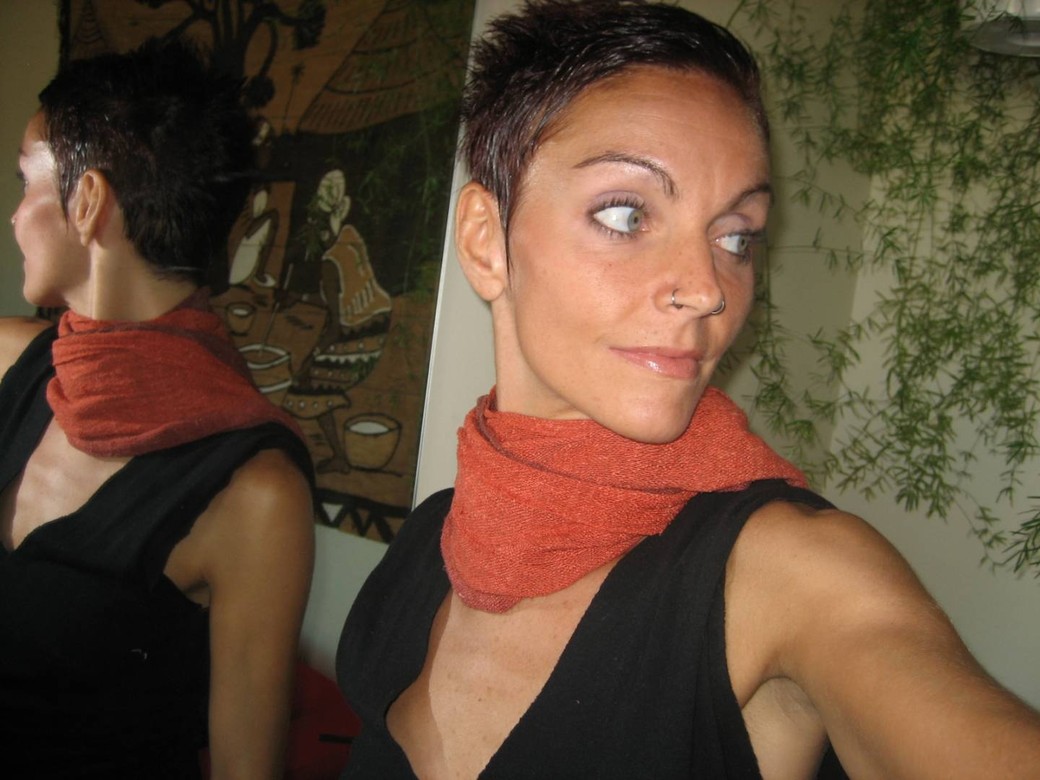
Deported Man from Guinea Sues Canadian Ex-Wife Lainie Towell
Love hurts. Few people know this better than Lainie Towell, an independent artist and dancer from the National Capital Region.
Eight years ago, in the spring of 2004, Lainie Towell traveled to the West African country of Guinea to study African choreography with a Guinean dance troupe. During her three month stay, she met a drummer in the dance troupe by the name of Fode Mohamed “Akra” Soumah. Their acquaintanceship evolved into a friendship which was maintained by email after Towell returned to Canada. Sometime during Towell’s second trip to Guinea less than one year later, her relationship with Soumah evolved from one of friendship to one of romance. After subsequent trips, the two became engaged in December 2006 and were married in Guinea in April 2007. In June of that same year, Towell applied to sponsor Soumah’s immigration to Canada, thereby agreeing to be financially responsible for his social welfare — as the law stipulates under these circumstances. By September he was issued a visa, although he would not arrive in Canada until New Year’s Eve 2007 at which time he was granted permanent residency status. On January 28, 2008, less than a month after his arrival, Soumah vanished into thin air.
Towell went public with her story, and also launched a highly publicized street protest in which she wore her wedding dress and walked past numerous Ottawa landmarks and government buildings carrying a bright red and white wooden door. On the door was a message that captured the attention of Canadian Immigration Minister Jason Kenney. It also helped to spark a national debate around the issue of marriages of convenience in Canada — which in turn led to the implementation of new legislation to curtail the flow of marriages of convenience. Since then, Towell’s story has certainly drawn the attention of both the media and the federal government to the issue of marriage fraud in Canada. What’s been brought to the forefront is that marriage fraud is so difficult to prove, which is why those who commit it rarely face legal consequences for their actions. Many newspapers and media outlets agree that Towell has become “the poster child for marriage fraud,” but it is interesting to revisit the events that led to Soumah’s sudden and unexpected departure as well as the subsequent findings of the Immigration and Refugee Board of Canada (IRBC) concerning this peculiar case.
In the short time span between Soumah’s arrival in Canada and his disappearance, his relationship with Towell rapidly deteriorated, given that his email communication with family and friends back home in Guinea revealed that Soumah had fathered a child with a fifteen year old dancer in his troupe by the name of Doussou Bangoura or “Bijou” as she is commonly known. When Towell confronted Soumah, he admitted that the allegations were true. Not surprisingly, the trust that Towell had for her husband was badly damaged by this revelation. Shortly after, Soumah suddenly vanished from the family home while Towell was at work and she never saw him until months later at his admissibility hearing.

On March 24th, 2009, having become aware of what was beginning to look like a high-profile case of marriage fraud the IRBC delivered its verdict. Speaking for the IRBC, Rolland Ladouceur stated that, “I cannot conclude that the marriage was entered into for immigration purposes Ladouceur stated that it ended simply because “it did not work out, and this is due in large part to the husband’s infidelity, a young girl of fifteen, and the fact that he continued to lie over a long period of time.” Soumah was found guilty of “misrepresentation.” As Ladouceur explains, “in my opinion, the evidence as a whole clearly shows that Mr. Soumah was aware that he had a son in Guinea before he came to Canada, and that he did not declare him upon his arrival, when he granted permanent residence.” Based on this reasoning, Ladouceur maintained that, “This, in my opinion, constitutes a misrepresentation of a material fact that could induce an error in the administration of the Act [the Immigration and Refugee Protection Act].” Consequently, Soumah’s intentional “misrepresentation” of his family situation upon arrival in Canada was determined to be adequate grounds for deportation.
Soumah appealed the removal order and the IRBC delivered its decision on his appeal on December 23rd, 2009. His appeal was promptly denied and the panel upheld the earlier removal order, stressing that, “the nature of the misrepresentation is very serious and strikes a blow at the very integrity of the immigration system. The appellant [Soumah] chose to mislead Canadian officials in order to immigrate to Canada.” The panel expanded upon this by stating that, “the panel finds that the reasons for the appellant’s omissions are obvious. Had he declared his child, an immigration officer would have followed up with the question of who is the mother and what is your relationship with her. If an immigration officer had discovered that the appellant had a relationship with the mother while he was engaged or married to another woman, namely, (Lainie Towell), then the immigration officer could have come to the conclusion that his marriage to Mme Towell was not genuine unless, of course, (she) would have decided herself to cancel her sponsorship before the appellant was landed. The panel considers that the nature of the misrepresentation is very serious and strikes a blow at the very integrity of the immigration system. The appellant chose to mislead Canadian officials in order to immigrate to Canada. The misrepresentation was intentional and continuous, the appellant has not expressed remorse, and he still does not understand the full gravity of his actions.” The IRBC had no proof that Soumah had committed marriage fraud but that he had indeed committed an act of malicious misrepresentation which violated the Immigration and Refugee Protection Act, thereby voiding his permanent residency status and requiring his deportation.
Although Soumah was deported from Canada in February 2012, the denial of his appeal to the IRBC has not stopped him from continuing to confront his former wife, by using the Canadian legal system, albeit through the surrogate of another Canadian woman named Cassandre Blier. Soumah married Blier a little over a week before his removal order was delivered. Interestingly, Blier has never been mentioned anywhere in Soumah’s case, and Towell says she “has never met the woman.” Through Cassandre Blier and her legal counsel, Soumah is currently suing Towell in civil court for declaring herself a victim of marriage fraud, for saying that Soumah has a child in Guinea, and for infringing on his privacy rights. Towell maintains that she has a right to tell her story because it deals with an issue of public interest, and that her freedom of expression is protected by the Canadian Charter of Rights and Freedoms. She also says that Soumah and Blier’s suit is what the legal profession refers to as a SLAPP lawsuit and that she is being revictimized nearly three full years after the IRBC upheld its deportation order of Soumah. According to a recent paper published at the Uniform Law Conference of Canada, “a SLAPP [Strategic Lawsuit against Public Participation] can be defined as a lawsuit initiated against one or more individuals or groups that speak out or take a position in a public debate on an issue of public interest [in this instance that issue is marriage fraud and misrepresentation].” The Uniform Law Conference of Canada goes on to identify that, “the purpose of SLAPPs is to limit the freedom of expression of the defendant [Lainie Towell] and neutralize their actions by resorting to the courts to intimidate them, deplete their resources and reduce their means of action.”
In a bizarre attempt to salvage his reputation in Canada — despite the fact that he has since been deported and remains in Guinea– this action allows Soumah to avoid having to make a deposit of money to the court to cover the court’s cost and associated fees in the case, which would otherwise be required of a foreign-national living outside of Canada who unilaterally attempts to sue a Canadian citizen in the Canadian legal system. In other words, since his civil suit is jointly filed with Blier, he does not need to pay the deposit himself. Instead, Canadian taxpayers will likely continue to pay tens of thousands of dollars to absorb the court’s costs associated with Soumah’s current case as he attempts to sue Towell, not to mention the thousands of dollars Canadian taxpayers have already contributed to the costs associated with his original IRBC case and his failed attempt to appeal the deportation order.
Nevertheless, Soumah and his new wife are both adamant that Soumah is not the father of Bijou’s child and that a paternity test that was delivered to government officials in the final moments leading up to his removal from Canada proves this. However, the fact remains that, in the words of Tracie LeBlanc, a communication adviser for Citizenship and Immigration Canada (CIC), “CIC only accepts DNA tests from accredited laboratories performed under CIC supervision. This protocol was not followed in this case.” Ultimately, whether or not the case is perceived as an instance of misrepresentation or marriage fraud, the bottom line is that Lainie Towell is being sued by a deported man who is now using a Canadian provincial court system after he already lost in the federal court of Canada.








